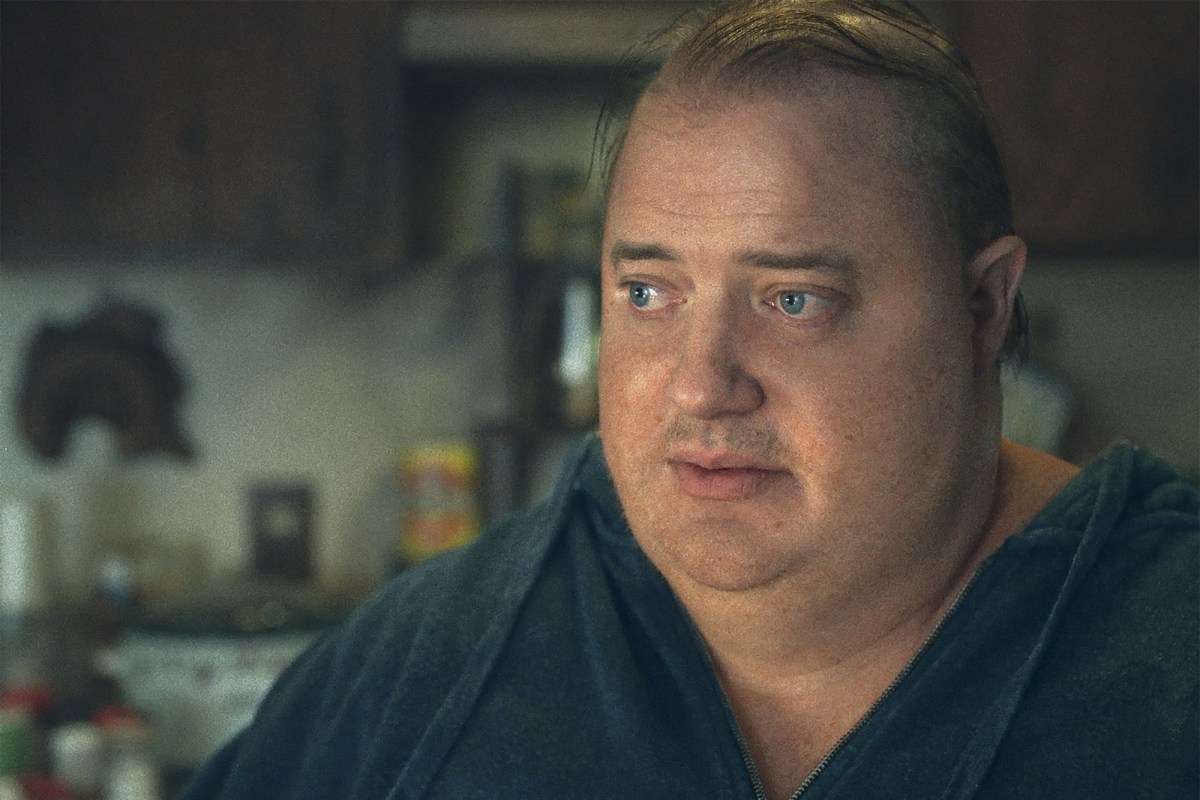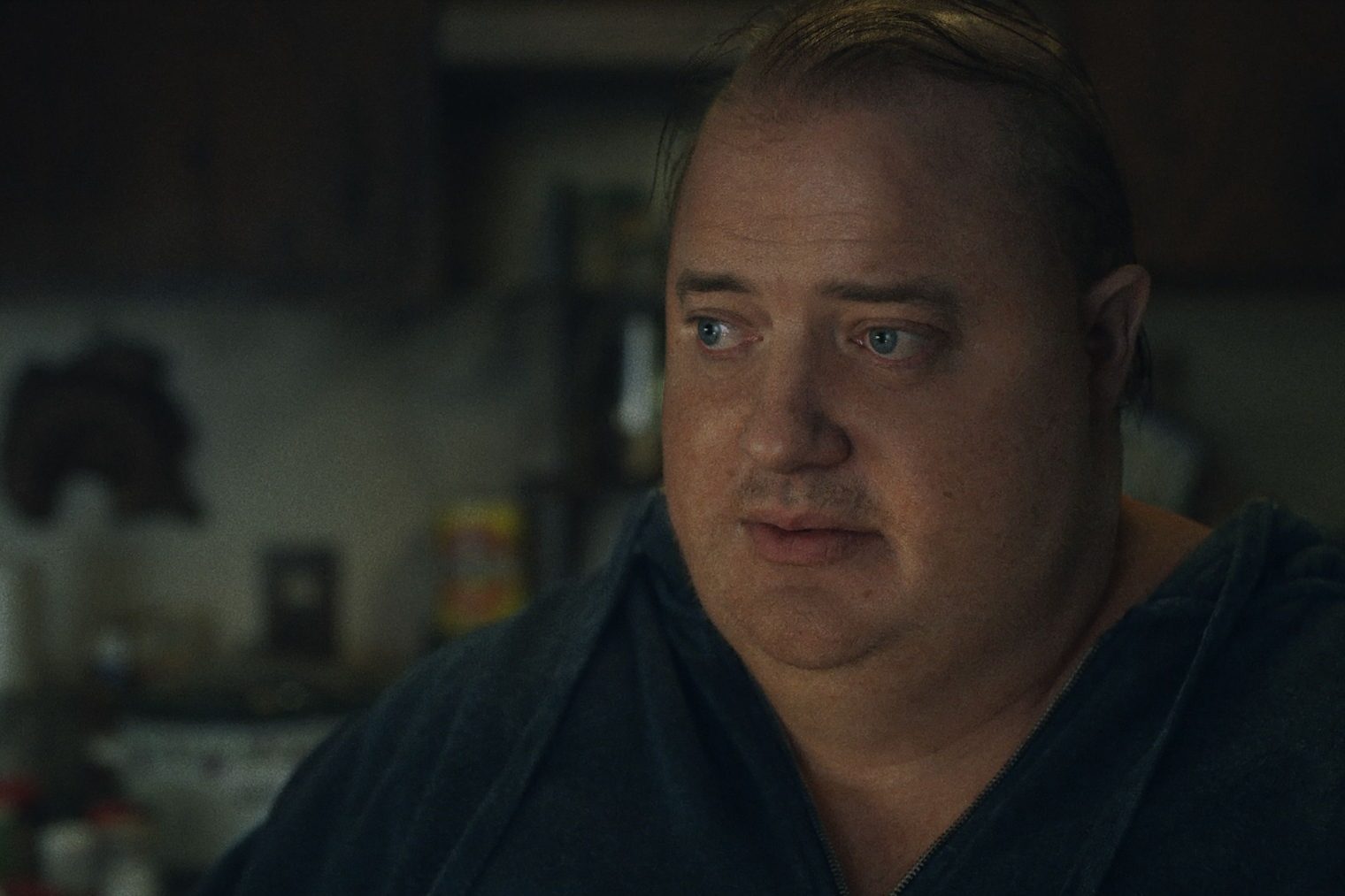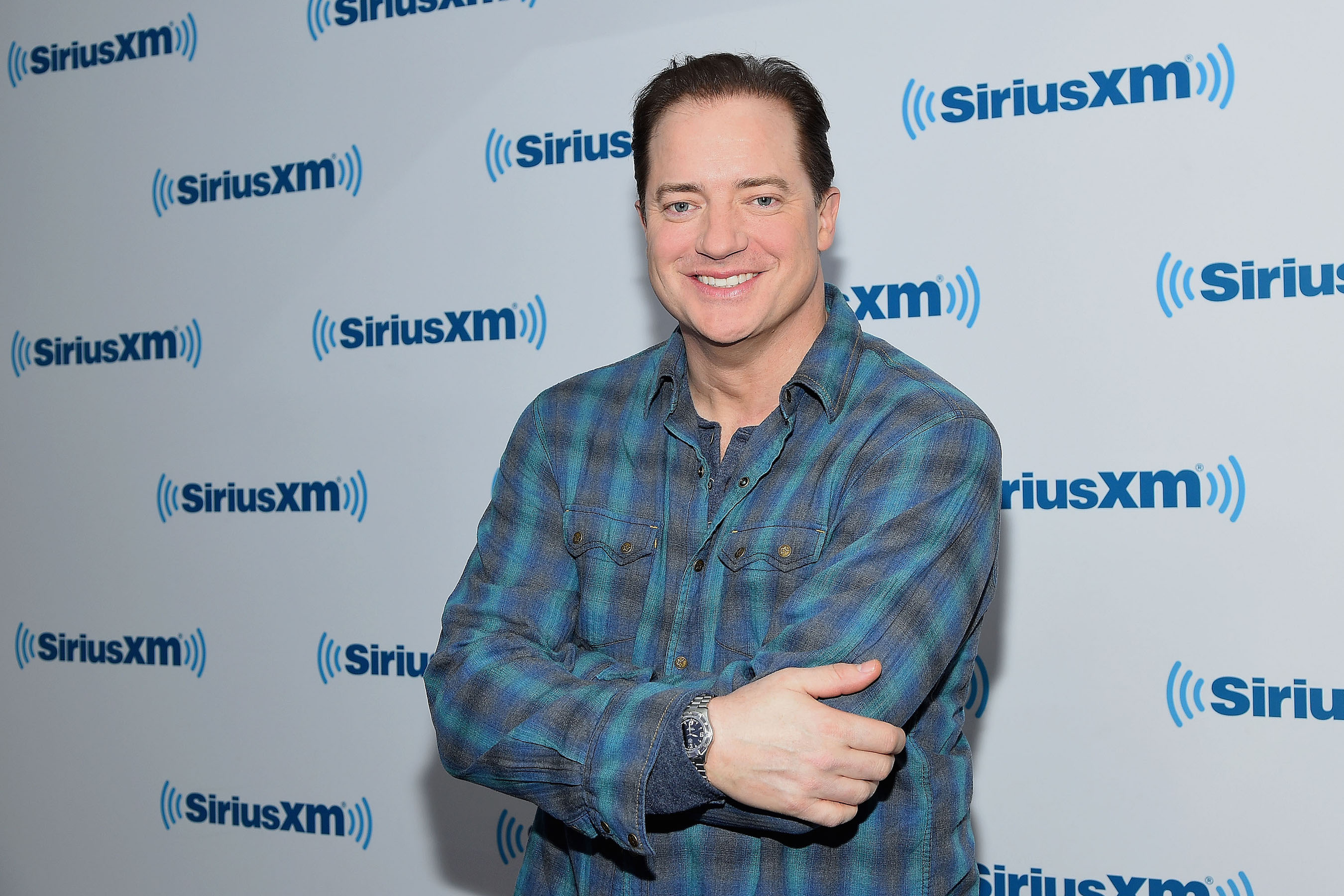For Charlie, the 600-pound man portrayed by rising phoenix Brendan Fraser in Darren Aronofsky’s new film The Whale, everything is difficult. Perambulating around the small apartment in drizzliest Idaho he hasn’t left in who knows how long requires the use of a walker. He has a grabber to pick up items dropped onto the floor without the strain of bending over, though flat objects such as a pesky key can elude his grasp. Dangling handles have been installed above his bed and in his shower to facilitate his entry and exit. Because his blood pressure is at such an extreme high that a Google search generates only instructions to call 911 immediately, even the slightest physical exertion leaves him gasping for breath, the masturbation that opens the film nearly inducing a heart attack.
The prosthetic weight piled onto Fraser’s body by a makeup team over the course of several hours each shooting day is meant as metaphor, a tangible manifestation of an unspeakable grief that would immobilize anyone else with the terminal lethargy of depression. Synthetic and symbolic as it may be, Charlie’s obesity is also a real thing with a complex set of connotations hard-wired into its depiction. Though a viewer can project exploitative fixation or empathetic focus into the camera’s gaze on his hulking physique, the music — heaving, tragic, as if we’re watching a documentary about war crimes or genocide — tells us how to feel and lays it on thick. In a hard-to-watch fit of despondence liable to trigger those with a personal connection to the subject, he self-harms by slathering pizza and cold cuts in ranch, a binge framed as outright horror with the afeared visual vocabulary to match. (Flashes of the various rock bottoms hit in Requiem for a Dream.) Some critics have not-unfairly deployed the charges of fatphobia pre-loaded back when the news of the project’s basic premise first broke, but Aronofsky’s issue would be most accurately classified as a generalized lack of delicacy and inability to modulate.
Charlie himself, conceived by playwright Samuel D. Hunter for the stage and now adapted by him for the screen, doesn’t make for an especially uncharitable image of fatness. He’s kind and intelligent, an upbeat guy, good at his job teaching lit-analysis night classes by Zoom. His heart is as full of love as it is arterial plaque. This portrait occupies itself with the question of his treatment, buttressing him with two interlopers intent on saving a man who doesn’t want or maybe even need their aid, and yet it looks upon him with the kind of alarm he politely declines. Aronofsky’s shocked fascination fits in with an overall tonal recklessness, each of Charlie’s visitors dialed up to 11 in scenes that mostly entail yelling at someone who cannot be moved by their words. Played with gentle humor and easy humility by a fantastic Fraser, he’s hardly the problem in a film that doesn’t know what do with any of its human beings. More invested in developing hazy theories about Christian mythology and the coming end times than the character study at hand, the film staggers inelegantly along the razor-thin line separating compassion from pity, concern from disgust and help from meddling.
Aside from the single location in the fetid hoarder-nest, a sense of finiteness comes from the prognosis that Charlie won’t make it through the week and his seeming acceptance of this death sentence. He takes the closing window as a prompt to start getting his affairs in order, while those in his limited circle see that they’ve got one last chance to reach him. For Liz (Hong Chau), the nurse checking in to provide some of the individualized medical care he refuses to get from a hospital, this mostly means berating him in between enabling him with the extra-cheesy meatball subs that might as well be a loaded gun. She’s the keeper of the flesh, and a polarity of opposites forms as a Christian missionary (Ty Simpkins) from the “New Life” church starts stopping by to play keeper of the soul. The pair pull their lost lamb in different directions, one toward penance and absolution by imploring Charlie to renounce his homosexuality, the other toward material continuation of an untenable lifestyle, neither addressing the festering emotional wound at the root of his suffering with their spirituality or science.
Chau adapts to the high-decibel tetchiness asked of her with more poise than anyone else in the cast, her outbursts paired with the rare dose of restraint in monologues saddling her with miserable backstory. The same cannot be said of Sadie Sink, seen as a star-on-the-rise for her work on the Stranger Things series and an appearance in a Taylor Swift music video, the limits of her talents brutally clear in her first gig for adults. She plays the daughter Charlie hasn’t seen in about a decade, come to squeeze some edits on her language arts homework out of him so she doesn’t get booted from high school. Ellie’s got ample cause to be mad at him, her dad having walked out when she was eight so he could start over with his student-turned-lover, but Sink overshoots her mark by several genres to land somewhere in unintended comedy. With a fuse so short it may well not exist, she flies into disproportionate furies reminiscent of Showgirls’ Nomi Malone barking that she comes from “DIFFERENT PLACES!” There’s more to Ellie under the surly exterior, but the switch-flipping imprecision of Sink’s methods can’t find it, Fraser instead forced to deliver her depth secondhand through his own epiphanies.
The last to join the parade of people come to heap verbal abuse on Charlie is his ex-wife Mary (Samantha Morton, in the rare instance of her severe miscasting), all too ready to chew him out on his way off of this mortal coil. If Aronofsky’s goal is to mete out so much punishment that we’re made to understand why Charlie would want to die so badly, then mission accomplished, but the ostensible mission of mercy gets lost in the process. He’s just another component of a conceptually-minded allegory, a mode practiced to far more assured and purposeful effect in the hectic mother! than in this turgid dispassion play. False prophets, Biblical allusions and other sacred texts (in this instance, a saved essay on Moby Dick that stumbles into a few genuine insights about the poetry of banality) pile up as Charlie wastes away.
In one of the final scenes, a fed-up Charlie beseeches his students to cut the pretentious intellectualizing and write something, anything, that’s true. This scans as auto-critique coming from a guy whose last movie put an artist’s turbulent relationship into mythic terms, an exhortation to drop that film’s maximalist theatrics and cut to the core of humanity. But as Charlie jokes when Liz facetiously threatens to stab him if he doesn’t take care of himself, his organs are under at least two feet of lipid deposits, too deep to reach. A wondrous turn from Fraser, his voice now at a strangulated yowl in an evolution all the more moving for being real, brings us as close as we get to connection with a script nonetheless infatuated with its own pondering. There’s precious little truth in Charlie’s Job-like buffet of tribulations, trapping him in a film as stifling as his airless home.
This article appeared in an InsideHook newsletter. Sign up for free to get more on travel, wellness, style, drinking, and culture.























